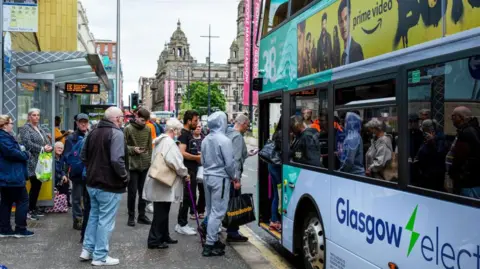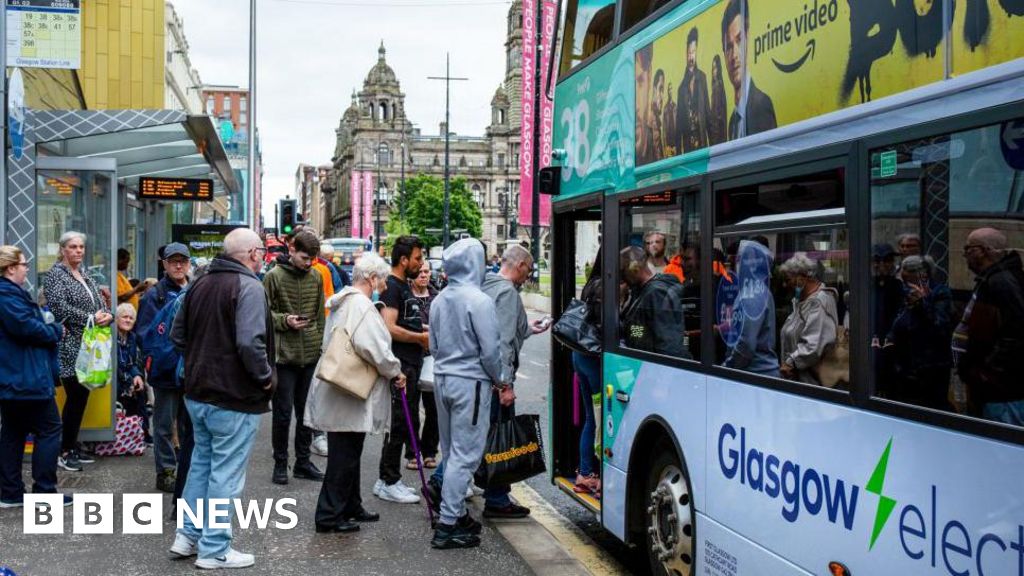 Getty Images
Getty ImagesThe Scottish government has scrapped plans to introduce free bus travel for asylum seekers.
It had announced it would hold a nationwide pilot of the scheme for asylum seekers who cannot work under UK immigration rules.
But a spokesperson blamed “very difficult decisions to deliver balanced and sustainable spending plans”.
The Scottish Greens, who had pushed for the plans as part of their power-sharing agreement with the SNP government, called the announcement a “shameful U-turn and a disgraceful decision”.
Campaigners previously said free bus travel would help prevent isolation among people in the asylum system, allowing them to more easily attend GPs, solicitors, language lessons and volunteering projects.
The equalities, human rights and civil justice committee heard evidence on proposals to improve the ayslum system in Scotland last year.
As a result, MSPs on the committee urged Holyrood to sanction concessionary bus travel for asylum seekers.
People in the asylum system are unable to work under UK employment law. Westminster provides £49.18 per week for people in uncatered accommodation, while those in hotels get £8.86 per week.
People said they were often forced to choose between eating or taking medicine due to the limited money.
Immigration and employment law is reserved to Westminster but the equalities committee had called on local authorities and the Scottish government to use “the full extent of their powers”.
Former First Minister Humza Yousaf confirmed the scheme in November and said £2m had been set aside to pay for it.
The commitment followed a long campaign by refugee-rights organisations and a pilot programme in Glasgow in 2023.
However, Finance Secretary Shona Robison recently warned that spending cuts were unavoidable, and ministers were ordered to “constrain all but essential” spending to help pay for public sector pay deals.
‘Broken promise’
Scottish Greens transport spokesman Mark Ruskell urged First Minister John Swinney to reconsider the decision to cancel the pilot.
“It is a broken promise to some of the most marginalised communities in our country and will only entrench the state-sanctioned poverty that people seeking asylum are forced into,” he said.
“Many have to live off around £50 a week to meet all their essential living needs.
“I am deeply disappointed that the Scottish government has chosen to do this.
“We have a serious responsibility as a country to do all we can to help protect people who seek safety here – not just in rhetoric, but in action too. This announcement flies in the face of that.”
A spokesperson for the Maryhill Integration Network said it was “extremely disappointed” in the Scottish government’s decision.
They said: “This news comes as a shock to all of us who have tirelessly provided information and campaigned to make this possible since December 2021.
“This decision will have a significant negative impact for people seeking asylum in Scotland. For some, it was the last ray of hope under such difficult and hostile policies.
“As third sector organisations who have been providing direct support to the most vulnerable in our communities, we know that having free bus travel would have a positive impact by providing support and connection with others, as well as allowing access to education, advice and advocacy.”
A Scottish government spokesperson said: “People seeking asylum in Scotland who are currently eligible for free bus travel through the national concessionary travel schemes, including those under 22 and over 60 years of age and those with disabilities, will continue to be able to make use of their entitlement.
“We remain committed to supporting people seeking asylum, refugees and communities through the New Scots refugee integration strategy approach.
“We want to work collaboratively with the UK government to contribute ideas that build on shared priorities and where possible provide evidence of impacts and needs.”

